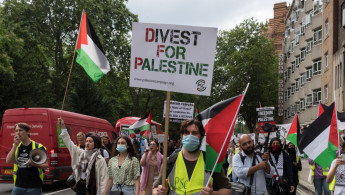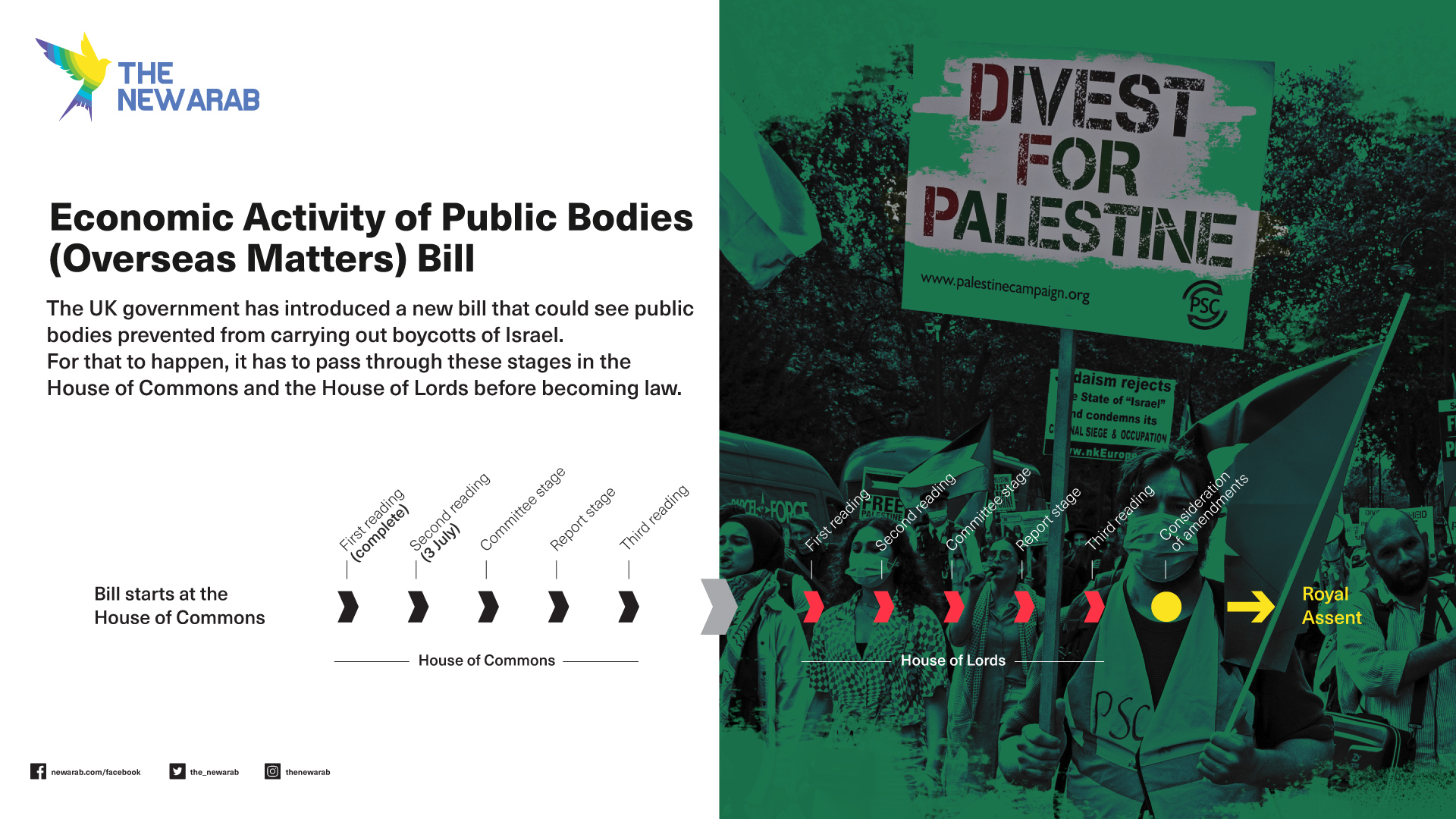EXCLUSIVE: UK anti-boycott bill 'incompatible' with ECHR, Amnesty says
The UK government's controversial anti-boycott bill is "clearly incompatible" with the European Convention on Human Rights (ECHR), Amnesty International has said after receiving legal advice.
The proposed legislation, officially titled the Economic Activity of Public Bodies (Overseas Matters) Bill, is due to have its second reading in the House of Commons on Monday in the next step in the legislative process.
The bill is aimed at preventing boycotts of Israel, including by councils, and has been criticised by the Palestine Solidarity Campaign. It would, however, also cover public bodies taking their own actions against other countries and territories.
"The proposed legislation is clearly incompatible with the UK's obligations under the European Convention on Human Rights, threatening to breach Articles 8 [privacy] and 10 [freedom of expression], and may also be in contravention of Article 19(3) of the International Covenant on Civil and Political Rights," Peter Frankental, Amnesty International UK's economic affairs programme director, told The New Arab.
"The government should draw back from this," he urged.
But Conservative Communities Secretary Michael Gove said in a statement included with the bill: "In my view the provisions of the Economic Activity of Public Bodies (Overseas Matters) Bill are compatible with the Convention [ECHR] rights."
Frankental's comments came after Amnesty received a legal opinion from Doughty Street Chambers lawyer Stephen Cragg KC.
Freedom of expression
The advice raised questions about the anti-boycott bill's compliance with freedom of expression rights under Article 10 of the ECHR.
"Assuming the bill does apply to individuals, it seems to me there is a strong case to say that it is incompatible with the ECHR and/or that application of its terms, especially [clause] 4, would have that effect in individual cases," said Cragg, a public law and human rights law specialist.
The bill would prevent public bodies from making procurement or investment decisions "influenced by political or moral disapproval of foreign state conduct", the current text of the proposed legislation says.
Clause 4 would prevent a decision-maker from publishing a statement saying they intend to make such a decision or that they would intend to make such a decision were the law not stopping them.
In his legal advice, Cragg addressed the issue of whether Communities Secretary Gove's bill imposes restrictions on individuals, whose Article 10 rights are protected under the Human Rights Act 1998.
Cragg quoted Gove as telling Lisa Nandy, his counterpart in the opposition Labour Party, that while public authorities would be impacted, "elected officials acting individually" would not.
But the lawyer added: "If that is the intention then it needs to be spelt out more clearly in the bill."
Whether individuals are impacted by the bill or not, the issue of free speech remains, according to Cragg's advice.
He said: "Even if Article 10 ECHR does not apply (because the decision-maker will always be a public authority), it is clear that the bill, and in particular clause 4, offends against the spirit of free speech."
He quoted comments made in 2019 by then-UN special rapporteur on freedom of expression David Kaye.
Kaye had said that a bill in the United States, which did not ultimately become law, "appeared clearly aimed at combatting political expression advocating boycott, divestment or sanctions against Israel".
He referenced Article 19 of the International Covenant on Civil and Political Rights, which says: "Everyone shall have the right to freedom of expression."
"One of the fundamental goals of Article 19 is to protect and promote robust political debate, which may include speech and activities that are offensive to some people or inconsistent with the preferences of political leaders," Kaye said.
"Indeed, it is precisely this kind of speech that deserves the most rigorous protection."
Privacy
Cragg also raised the potential impact of the anti-boycott bill on privacy rights.
"Investigations into any purported or proposed contravention of the ban imposed by clause 1 would appear to allow an enforcement body to request extensive disclosure of information about the individuals making a relevant decision as well as 'any person seeking to persuade the decision-maker to act in a certain way,'" he said.
"This could pose severe intrusions on individuals' right to respect for private life under Article 8 ECHR while also impacting even further on freedom of expression rights."
Clause 1 is the section of the bill that prohibits decisions from being influenced by political or moral disapproval of foreign state conduct.
Response: 'Bill is compatible' with ECHR
In response to a request for comment, a spokesperson for the UK's Department for Levelling Up, Housing and Communities said: "The government has made its position on boycotts clear. We are firmly opposed to local boycotts which can damage integration and community cohesion, hinder exports, and harm our economic security.
"The bill is compatible with the convention [ECHR] and [the] government remains committed to our manifesto pledge to ban public bodies from imposing their own boycotts, disinvestment or sanctions campaigns."
'Could have grave implications globally'
Amnesty is not the only civil society organisation to express concerns about the anti-boycott bill.
In a briefing document, Human Rights Watch said the proposed legislation "could have grave implications globally by restricting public bodies' freedom to responsibly engage or disengage from business relationships when to do so would cause or contribute to human rights abuses or international crimes".
A UK government press release earlier this month said the bill would "stop businesses and organisations – including those affiliated with Israel – being targeted through ongoing boycotts by public bodies – leading to community tensions and, in the case of Israel, a rise in antisemitism".
But on Friday, Conservative MP Flick Drummond said in a newsletter that she feared the bill would "lead to greater antisemitism, not less".
She cited its explicit naming of Israel, the occupied Palestinian territory and the Israeli-occupied Golan Heights.
The bill mentions these three locations in a provision that would make it more difficult for future exemptions to be made allowing public bodies to launch boycotts of Israel.
Note: This story was updated at 21:25 GMT on 2 July 2023 after the UK's Department for Levelling Up, Housing and Communities responded to a request for comment.






 Follow the Middle East's top stories in English at The New Arab on Google News
Follow the Middle East's top stories in English at The New Arab on Google News


